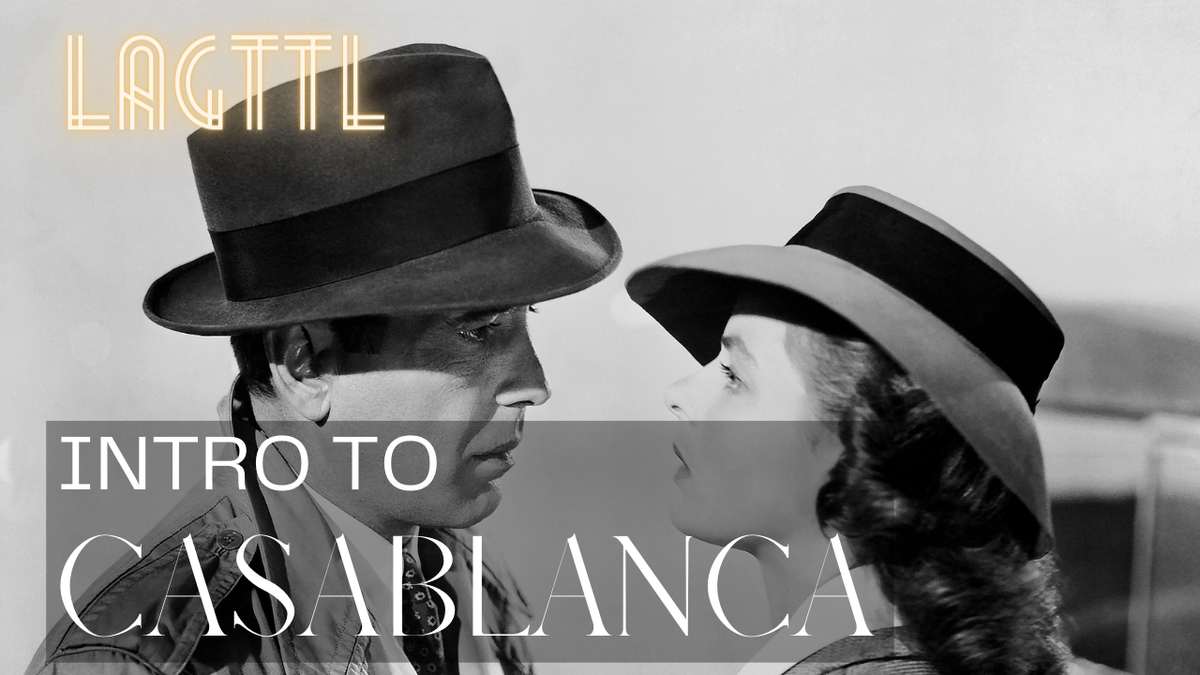Hi, I'm Harry Marks and this is Let's All Go to the Lobby—your introduction to the film you're about to watch. Up next is the film that took [[Humphrey Bogart]] and Ingrid Bergman from Hollywood stars to Hollywood icons.
Released in 1942, CASABLANCA tells the story of Rick Blaine, played by Bogart at his most charming and vulnerable, who reconnects with his old flame, Ilsa Lund, played by Bergman, as she tries to secure passage to America for herself and her husband, Victor Laszlo, played by Paul Henreid.
CASABLANCA has something of a storied history. It was based on the unproduced play "Everybody Comes to Rick's" written by Murray Burnett and Joan Alison.
[[Warner Brothers]] bought the rights to it for 20,000 dollars—12 thousand more than it had paid for the Maltese Falcon.
Burnett wound up regretting his decision, claiming quote "These characters are a part of me, and I have great regard for them." He resurfaced with a vengeance in the 1980s after the studio tried to launch a TV show based on the film, which was canceled after two episodes.
As for CASABLANCA's production, it was something of a mess. Four months before filming began, rumors began to swirl around who would play Ilsa and Rick—and at the top of the list were Ann Sheridan of Angels with Dirty Faces fame, and…
Ronald Reagan, respectively.
Luckily, those rumors were far from true. Production started on May 25th, 1942, a little over a month after its original planned start date.
To make matters worse, the script wasn't complete…like ever. Even as the final scene was being filmed, the characters and dialogue were constantly being changed, mainly because writers kept drifting in and out of the production.
When the flashback scenes in Paris were shot, for example, Bergman had no idea if she should act in love with Rick, or with Victor, so director Michael Curtiz told her to quote "play it in-between."
Bogart also hated filming those scenes, saying "I'm not up on this love stuff and don't know just what to do."
In fact, he and Curtiz had such a combative relationship on set, that when the final scene was being shot—where Rick tells Ilsa to get on the plane—the two men got so heated over a line delivery, that producer Hal Wallis had to break them up.
As for the rest of the production, many roles, including those of several Nazis, were played by Jewish and German refugees—such as [[Conrad Veidt]], who played Nazi officer Major Strasser. He had been forced to leave Germany after learning that the SS had sent a death squad after him.
And in the scene where the cafe's patrons drown out the Nazis with their rendition of La Marseilles, the tears streaming down French actress Madeleine Lebeau's face during her closeup are real tears. Lebeau and her Jewish husband had fled Paris just before the Nazis invaded.
By the time she made her appearance in CASABLANCA, France had already fallen to Nazi forces, and so her lines, "Vive la France! Vive la liberte!" were some of the most authentically spoken words in the film.
And finally, we have perhaps the most recognizable aspect of CASABLANCA in Herman Hupfeld's song, "As Time Goes By." Funny enough, the tune almost didn't end up in the final cut. It had been part of the original play, but composer Max Steiner didn't care for it and tried to get it taken out.
Unfortunately for him—and fortunately for us—Bergman's scenes with the song had already been filmed and she'd already moved on to her next role, and so with no way to reshoot her scenes, they were left in and the song was included.
As a result, "As Time Goes By" spent 21 weeks on the charts.
There is an endless amount of trivia about this film, but I only have so much time, and so…starring Humphrey Bogart, Ingrid Bergman, Conrad Veidt,
Claude Rains, Paul Henreid, Sydney Greenstreet, Peter Lorre, and Dooley Wilson, here it is—Michael Curtiz's legendary motion picture about love and war…CASABLANCA.

